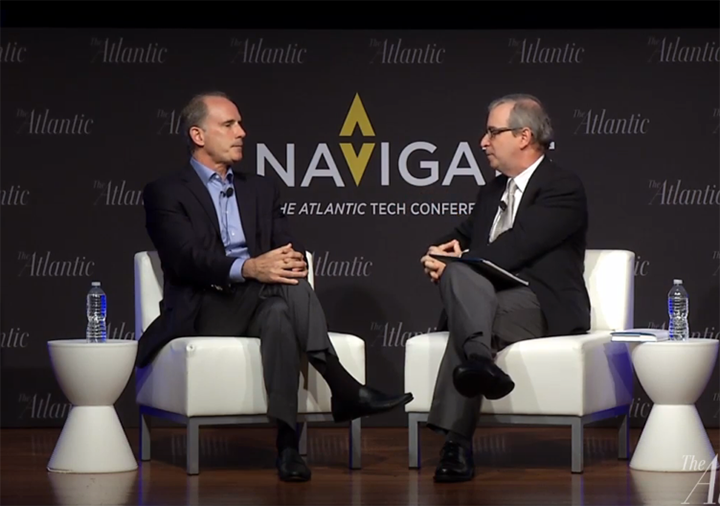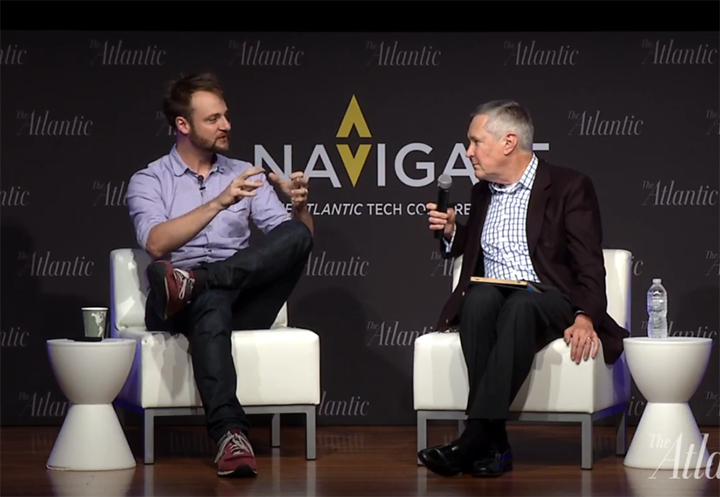
An impressive lineup of technology executives took the stage on Tuesday in San Francisco at "Navigate," the Atlantic Tech Conference 2014, and several company leaders offered glimpses into future new technologies, the evolving "Internet of Things" industry, and their own personal passions.
A top executive from Google - Jonathan Rosenberg - who was the former head of products for the company and is now a senior advisor to CEO Larry Page, told the "Navigate" audience that he believes the smart contact lens is the "closest" of the infamous Google X projects to becoming reality.
The smart lens is designed to automatically monitor glucose levels as an aid for diabetes sufferers. It comes from the company's top-secret design lab, known as Google X, which is also working on driverless cars and high-altitude Wi-Fi balloons.
Another speaker at the event was Evan Sharp, the co-founder of Pinterest, the fast-growing web and mobile app company which now claims 70 million users. Sharp took issue with descriptions of his site as a social network, preferring to characterize it as a discovery tool.
"Our discovery engine is not powered by algorithms or web crawlers," said Sharp. "It's powered by actual humans showing their interest."

Asked by Atlantic's James Fallows to describe his worst nightmare in business, Sharp replied, "Selling the company and working somewhere I hate."
Padmasree Warrior, Chief Technology and Strategy Officer for Cisco, talked about how the next evolution in technology will involve bringing the industry closer to human interaction through artificial intelligence and enhanced search. "I'm a big believer in combining arts and technology," said Warrior.
The Cisco executive also spoke about her own involvement in the arts through her painting. Warrior is an avid painter and she often shares her work through postings on Twitter and other sites.
Another executive who took the stage was Anne Wojcicki, the co-founder and CEO of 23andMe, a DNA service that provides genetics reports on ancestry and family history through evaluation of the 23 pairs of chromosomes in a normal human cell. The company has been in the news recently because the Food and Drug Administration (FDA) ordered them to cease their genetic testing a year ago.
"We're working very hard with the FDA to try and bring that (service) back to the market," Wojcicki said on Tuesday. In the meantime the company announced last week that their DNA screening kit would be available for use in the U.K.
Space exploration was also on the conference agenda as Gwynne Shotwell, the President of SpaceX, was interviewed by Atlantic's Mary Louise Kelly. It was reported yesterday that the company is closer to becoming certified to launch satellites for the U.S. military, but a longer-range goal of the firm is to begin manned spaceflights to Mars.
"I want to go beyond this solar system," Shotwell told the gathering. She described how SpaceX was building a floating landing strip in the ocean to test their prototype aircraft, which must be able to make the eight-month journey and safely return back to earth.
Asked by Kelly whether she planned to go on the inaugural flight, Shotwell replied, "I would go, but I wouldn't be the first."
The conference audience was given a live demonstration of a different kind of flight on Tuesday when Chris Anderson, former editor of Wired and founder of 3D Robotics, launched his camera-equipped drone from the stage and let it hover over the attendees. "We have the ability to 3D scan the world now with simple cameras," said Anderson.
His company is focusing primarily on the use of drones to capture images for use by farmers and the agriculture industry as a way to improve crop efficiency and also protect endangered species in remote jungles around the world.
Aaron Levie, the co-founder and CEO of Box, made a brief appearance and spoke about the challenges of bringing his cloud storage company into profitability. Box, which has repeatedly delayed plans for an IPO, has lost over $400 million in the last three years.
Despite the continued losses, Levie appeared upbeat about his business model as he bantered with Atlantic's Washington Editor Steve Clemons about the financial problems faced by the publishing industry as well. "Yes, but we actually make money," countered Clemons, which drew much laughter from the conference audience.
It was a pointed reminder that in the maturing technology industry where multi-year losses are commonplace today, there are some historic businesses such as the 157 year-old conference sponsor which can still generate a profit.














